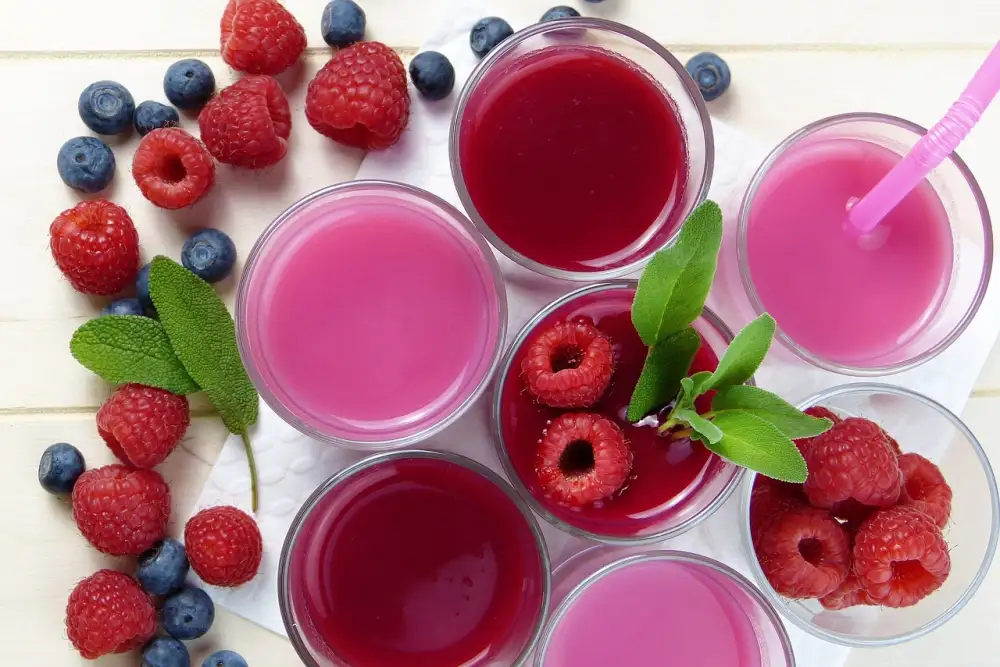Revitalize Your Health with a Juice Diet: The Ultimate Guide to Rejuvenation

Are you looking for a way to revitalize your health and rejuvenate your body? Look no further than the juice diet! This popular diet trend has taken the health and wellness world by storm, offering a natural and effective way to detoxify and nourish your body. By incorporating fresh, nutrient-rich juices into your daily routine, you can experience a wide range of benefits that will leave you feeling energized and revitalized. In this ultimate guide to rejuvenation, we will explore the benefits of a juice diet, how to start one, choosing the right juices for your diet, incorporating solid foods, potential risks and precautions, tips for success, frequently asked questions, and ultimately help you determine if the juice diet is right for you. Get ready to embark on a journey towards better health and vitality with the power of juice!
Benefits of a Juice Diet
A juice diet offers numerous benefits for your health and well-being. Here are some of the key advantages:
1. Increased nutrient intake: Juicing allows you to consume a wide variety of fruits and vegetables in a concentrated form, providing an instant boost of essential vitamins, minerals, and antioxidants.
2. Improved digestion: The high fiber content in freshly pressed juices can help promote healthy digestion by supporting regular bowel movements and reducing bloating.
3. Enhanced detoxification: Juices act as natural cleansers, aiding in the elimination of toxins from your body. This can lead to improved skin complexion, increased energy levels, and overall rejuvenation.
4. Weight loss support: A juice diet can be an effective tool for weight management as it is low in calories while still providing essential nutrients. It can help curb cravings, reduce calorie intake, and promote healthy eating habits.
5. Boosted immune system: The abundance of vitamins and minerals found in fresh juices strengthens your immune system, making you less susceptible to illnesses and infections.
6. Increased hydration: Juices are an excellent source of hydration as they contain high water content. Staying properly hydrated is crucial for maintaining optimal bodily functions.
Remember that while a juice diet offers many benefits, it should be approached with caution and balanced with other healthy lifestyle choices.
How to Start a Juice Diet
Starting a juice diet can be an exciting and rejuvenating experience. Here are some steps to help you get started:
1. Set your goals: Determine why you want to start a juice diet. Is it for weight loss, detoxification, or simply to improve your overall health? Setting clear goals will keep you motivated throughout the process.
2. Plan your juices: Research different juice recipes and decide which ones align with your goals and taste preferences. It's important to have a variety of fruits and vegetables in your juices to ensure you're getting a wide range of nutrients.
3. Invest in a juicer: Purchase a high-quality juicer that suits your needs and budget. Cold-press juicers are recommended as they retain more nutrients compared to centrifugal juicers.
4. Stock up on produce: Buy fresh, organic fruits and vegetables for juicing. Ensure you have enough supplies for at least a few days to avoid running out of ingredients.
5. Start slowly: Begin by replacing one meal or snack with a juice each day. This will allow your body to adjust gradually without feeling overwhelmed.
6. Stay hydrated: Alongside your juices, drink plenty of water throughout the day to stay hydrated and support the detoxification process.
7. Listen to your body: Pay attention to how your body responds to the juice diet. If you feel weak or lightheaded, consider incorporating small amounts of solid foods into your diet until you adjust.
Remember, it's essential to consult with a healthcare professional before starting any new diet, especially if you have underlying health conditions or are taking medications.
Choosing the Right Juices for Your Diet
When embarking on a juice diet, it's crucial to select the right juices that will provide you with the necessary nutrients and support your health goals. Here are some tips for choosing the right juices:
1. Go for a variety: Incorporate a mix of fruits and vegetables in your juices to ensure you get a wide range of vitamins, minerals, and antioxidants. Experiment with different combinations to find what suits your taste buds.
2. Opt for fresh and organic: Choose fresh, organic produce whenever possible. This ensures that your juices are free from harmful pesticides and additives, maximizing their nutritional value.
3. Consider your goals: If you're looking to detoxify or boost immunity, opt for green juices packed with leafy greens like spinach, kale, and cucumber. For energy and vitality, choose fruit-based juices with ingredients like oranges, berries, and pineapple.
4. Watch out for sugar content: While fruits are naturally sweet and nutritious, they can also be high in sugar. Balance fruit juices with vegetable juices to minimize sugar intake.
5. Listen to your body: Pay attention to how your body responds to different ingredients in your juices. Some people may have sensitivities or allergies to certain fruits or vegetables. Make adjustments accordingly.
Remember that juicing should complement a balanced diet rather than replace it entirely. Consult a healthcare professional or nutritionist before making any significant dietary changes or if you have any underlying health conditions.
By selecting the right juices for your diet, you can maximize the benefits of a juice cleanse and support overall wellness.
Incorporating Solid Foods into Your Juice Diet
While a juice diet primarily consists of consuming fresh juices, it is important to incorporate solid foods to ensure a balanced and sustainable approach. Solid foods provide essential nutrients and fiber that may be lacking in a purely liquid diet.
Here are some tips on how to incorporate solid foods into your juice diet:
1. Start with light meals: Begin by introducing easily digestible foods such as steamed vegetables, soups, or salads. These will help ease your body into the transition from a solely liquid-based diet.
2. Choose nutrient-dense options: Opt for whole grains, lean proteins, and healthy fats like avocado or nuts. These foods will provide sustained energy and keep you feeling satisfied.
3. Portion control: Be mindful of portion sizes when reintroducing solid foods. Start with smaller portions and gradually increase as your body adjusts.
4. Focus on plant-based options: Incorporate plenty of fruits, vegetables, legumes, and whole grains into your meals. These plant-based foods are rich in vitamins, minerals, and antioxidants that support overall health.
5. Stay hydrated: Even though you're consuming juices, it's still important to drink plenty of water throughout the day to stay hydrated.
By incorporating solid foods alongside your juice regimen, you can ensure a well-rounded diet that provides all the necessary nutrients for optimal health and rejuvenation. Remember to listen to your body's needs and make adjustments accordingly for a successful juice diet experience.
Potential Risks and Precautions of a Juice Diet
While a juice diet can offer numerous health benefits, it is important to be aware of the potential risks and take necessary precautions before embarking on this journey. Here are some things to consider:
1. Nutrient Deficiencies: Juicing removes the fiber from fruits and vegetables, which can lead to a deficiency in certain nutrients like fiber, protein, and healthy fats. It is crucial to ensure that you are still getting these essential nutrients from other sources.
2. Blood Sugar Imbalance: Some juices may contain high amounts of natural sugars, which can cause a rapid spike in blood sugar levels. If you have diabetes or any other blood sugar-related condition, it is advisable to consult with your healthcare provider before starting a juice diet.
3. Lack of Satiety: Juices do not provide the same level of satiety as whole foods, which may leave you feeling hungry and unsatisfied. It is important to listen to your body's hunger cues and incorporate solid foods into your diet as needed.
4. Potential for Weight Gain: While a juice diet can aid in weight loss initially, it is possible to regain weight once you resume your regular eating habits. It is crucial to focus on long-term lifestyle changes rather than relying solely on juicing for weight management.
5. Interactions with Medications: Certain medications may interact with specific fruits or vegetables used in juices. If you are taking any medications, consult with your healthcare provider to ensure there are no potential interactions.
To minimize these risks, consider the following precautions:
- Consult with a healthcare professional before starting a juice diet, especially if you have any underlying health conditions.
- Choose a variety of fruits and vegetables for juicing to ensure a balanced nutrient intake.
- Monitor your blood sugar levels if you have diabetes or other blood sugar-related conditions.
- Incorporate solid foods into your diet as needed for satiety and to maintain a balanced nutrient intake.
- Gradually transition into and out of the juice diet to minimize any potential side effects.
By being aware of these risks and taking necessary precautions, you can safely enjoy the benefits of a juice diet while minimizing any potential negative effects on your health.
Tips for a Successful Juice Diet
1. Start slowly: Gradually introduce juices into your diet and gradually reduce solid food intake. This will help your body adjust to the changes and minimize any potential side effects.
2. Stay hydrated: In addition to consuming juices, it's important to drink plenty of water throughout the day. This will help flush out toxins and keep your body properly hydrated.
3. Choose organic produce: Opt for organic fruits and vegetables whenever possible to avoid ingesting harmful pesticides or chemicals.
4. Mix up your juices: Experiment with different combinations of fruits, vegetables, and herbs to keep your taste buds excited and ensure you're getting a variety of nutrients.
5. Listen to your body: Pay attention to how you feel during the juice diet. If you experience any discomfort or adverse effects, consult a healthcare professional.
6. Get support: Join online communities or find a juice diet buddy who can provide motivation, share recipes, and offer guidance throughout your journey.
7. Plan ahead: Prepare your juices in advance and have them readily available throughout the day. This will prevent you from reaching for unhealthy snacks when hunger strikes.
8. Practice self-care: Incorporate relaxation techniques such as yoga or meditation into your daily routine to reduce stress levels and enhance overall well-being.
Remember, a juice diet should be seen as a short-term cleanse or rejuvenation tool rather than a long-term solution for weight loss or health maintenance. Always consult with a healthcare professional before starting any new diet or lifestyle change.
Frequently Asked Questions about the Juice Diet
1. Is the juice diet suitable for everyone?
The juice diet can be beneficial for most people, but it is always recommended to consult with a healthcare professional before starting any new diet, especially if you have any underlying health conditions.
2. Can I drink any type of juice during the diet?
While it is important to include a variety of fruits and vegetables in your juices, certain juices may be more beneficial for specific health goals. For example, green juices are great for detoxification, while citrus juices are high in vitamin C. Experiment with different combinations to find what works best for you.
3. How long should I stay on a juice diet?
The duration of a juice diet varies depending on individual goals and preferences. Some people choose to do a 3-day cleanse, while others may opt for longer periods. It is essential to listen to your body and make sure you are getting all necessary nutrients.
4. Can I exercise while on a juice diet?
Light exercise such as walking or yoga is generally safe during a juice diet. However, intense workouts may not be advisable due to the limited calorie intake. Always listen to your body and adjust your activity level accordingly.
5. Will I lose weight on a juice diet?
Weight loss can be achieved through a juice diet since it typically involves reduced calorie intake. However, it is crucial to focus on overall health rather than just weight loss when embarking on this journey.
6. Are there any side effects of the juice diet?
Some people may experience temporary side effects such as headaches or fatigue during the initial days of the juice diet as their bodies adjust to the change in eating habits. These symptoms usually subside after a few days.
7. Can I continue taking medications while on a juice diet?
If you are currently taking prescription medications, it is important not to discontinue them without consulting your healthcare provider first. They will be able to guide you on how to incorporate your medications into your juice diet.
Remember, the juice diet is not a long-term solution and should be used as a way to jumpstart a healthier lifestyle. It is always best to seek guidance from professionals and listen to your body throughout the process.
The juice diet can be a powerful tool for rejuvenating your health and revitalizing your body. It offers numerous benefits, including weight loss, increased energy levels, improved digestion, and enhanced nutrient intake. However, it is important to consider whether the juice diet is right for you.
Before starting a juice diet, consult with your healthcare provider, especially if you have any underlying health conditions or are taking medication. They can provide guidance on whether a juice diet is safe and suitable for you.
Additionally, it is essential to approach the juice diet with caution and moderation. While it can be an effective short-term cleanse or reset, relying solely on juices for an extended period may lead to nutrient deficiencies and potential health risks.
If you decide to try a juice diet, ensure that you choose fresh, organic fruits and vegetables and vary your juice recipes to maximize nutrient intake. Gradually incorporate solid foods back into your diet after the cleanse to maintain a balanced eating plan.
Remember that everyone's body is different, and what works for one person may not work for another. Listen to your body's needs and adjust your diet accordingly.
Ultimately, the decision of whether the juice diet is right for you depends on your individual goals, preferences, and overall health. If done correctly and under professional supervision, it can be an excellent way to kickstart a healthier lifestyle.
Published: 06. 12. 2023
Category: Health



